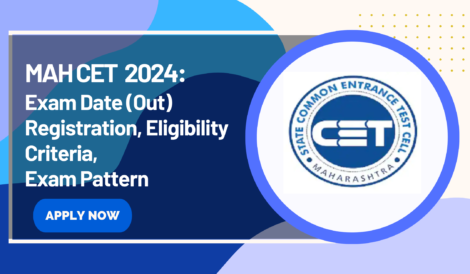Table of Contents
1. Introduction
1.1 What is IMU CET?
IMU CET Exam is an important Entrance Exam that helps you get admission to maritime colleges to study ships and the maritime industry. It is a key exam if you want to study subjects like Marine Engineering, Nautical Science, and other courses related to working on ships.
You need to pass the IMU CET Exam to join programs like operating a vessel, maintaining ship engines, or overseeing ship operations. These courses help you become a professional in the maritime industry. Jobs you can get include being a ship captain, marine engineer, or maritime logistics manager.
IMU CET Exam is conducted once a year and is the way to get into top maritime universities in India.
Passing this exam can help you start a career in the world of maritime exploration. You can work on different types of ships, travel the world, and learn many new skills.
1.2 Why You Need to Know About the Exam
It is very important to know what is in the exam and how it works. This helps you prepare better and feel less nervous about the test.
When you know what to study, you can use your time well and feel ready. Understanding the subjects and the number of questions in each part helps you make a good study plan.
If you know the exam format, nothing will surprise you on test day. You will feel more confident, and confidence is key to doing well in any exam.
Knowing about the exam also helps you practice the right way.
If you know that there are no negative marks, you can try all the questions without worrying about losing points. This way, you can score higher by attempting more questions.
Preparing with the right information makes your study time effective. You can focus on the areas where you need the most practice.
2. How the IMU CET Exam Works
2.1 How You Take the Test
IMU CET is taken on a computer. You have to go to a special center to take it.
The test center has computers set up for you. You will sit at a computer and answer the questions on the screen.
There will be helpers in the center to guide you if you need help using the computer. It is a simple process, and the helpers make sure everything goes smoothly so you can focus on doing your best.
Before the real test, you will get a few minutes to practice on the computer.
This practice helps you understand how to select answers and move between questions. This way, you will feel comfortable using the computer, and you can do your best without any problems.
2.2 Time and Language
The exam takes 3 hours, and it is in English. You need to understand English to answer the questions.
You need to manage your time well during the 3 hours to answer all questions. Don’t spend too much time on any one question because you need to complete all sections.
Practicing time management while studying will help you finish the exam on time.
2.3 Question Type
All questions are multiple-choice. You have to pick the correct answer from four choices.
Multiple-choice questions are easier if you have prepared well because you can see all the options. You can also use the process of elimination—remove the answers that are obviously wrong and focus on the remaining ones to find the right answer.
2.4 Subjects and Number of Questions
The exam has questions from different subjects:
- English: 25 questions
- General Aptitude: 25 questions
- Physics: 50 questions
- Chemistry: 25 questions
- Math: 50 questions
Total Questions: 200
Each subject is important, and you should make sure to study all of them. English helps you with communication, General Aptitude helps with problem-solving, and Physics, Chemistry, and Math are key to understanding how things work on a ship. Focusing on all subjects equally will give you the best chance of scoring well.
2.5 Marking Rules
You get one point for every right answer. There is no penalty for wrong answers, so you can try every question. This is a big advantage because it means there is no risk in guessing. If you don’t know an answer, you should still try to pick one of the choices. You might get it right and get an extra point. Since there is no negative marking, make sure to attempt all 200 questions.
3. What to Study for IMU CET Exam
3.1 English
This part checks how well you know English.
- Grammar: Words, sentences, and how they fit together. You need to understand the rules of English so you can speak and write well.
- Vocabulary: Words and their meanings. You should know many different words and their meanings to do well in this section.
- Reading: Understanding short stories or passages. You need to read quickly and understand what the text is saying.
3.2 General Aptitude
This part checks your problem-solving skills.
- Reasoning: Simple puzzles and patterns. You need to think logically to solve these puzzles.
- Math Skills: Easy math problems. These questions test your ability to solve simple math questions quickly.
- Data Questions: Understanding charts and tables. You need to look at graphs or tables and answer questions about the information shown.
3.3 Physics
Physics questions are about basic ideas you learned in school.
- Movement: How things move. You need to know about speed, velocity, and how objects move.
- Electricity: Charges and electric fields. This includes topics like current, voltage, and how electricity works.
- Light: How light works and mirrors. You will learn about reflection and refraction.
- Modern Physics: Atoms and energy. This includes atomic structure and different forms of energy.
3.4 Chemistry
Chemistry questions test your understanding of different types of chemicals.
- Physical Chemistry: Matter and heat. This includes states of matter and how they change.
- Inorganic Chemistry: Elements and bonds. You need to know about the periodic table and chemical reactions.
- Organic Chemistry: Compounds like fuels. This includes learning about hydrocarbons and other organic molecules.
- Environmental Chemistry: Pollution and clean chemistry. You need to know about how chemicals affect the environment.
3.5 Math
Math is an important part of the exam.
- Algebra: Equations and number patterns. You need to solve different types of equations.
- Calculus: Limits and basic derivatives. This helps you understand rates of change.
- Trigonometry: Angles and triangles. You need to know how to work with angles and different trigonometric functions.
- Geometry: Lines, circles, and shapes. You need to understand different shapes and their properties.
4. Tips for Preparing
4.1 Know the Exam Well
To do well in IMU CET Exam, it’s important to understand how the exam works in detail. First, get familiar with the number of questions and the scoring system. This information helps you plan your preparation better. For example, knowing that the exam has 200 questions allows you to calculate how much time you can spend on each question.
Practice finishing all questions within the given 3-hour timeframe. You can do this by taking timed mock tests, which simulate the actual exam. Here’s a table that can help you organize your time effectively:
| Section | Number of Questions | Suggested Time Allocation |
|---|---|---|
| English | 25 | 20 minutes |
| General Aptitude | 25 | 20 minutes |
| Physics | 50 | 40 minutes |
| Chemistry | 25 | 20 minutes |
| Math | 50 | 60 minutes |
| Revision/Buffer Time | – | 20 minutes |
Knowing the structure of the exam helps you avoid surprises on test day. It also boosts your confidence, which is crucial for performing well.
4.2 Study Everything
Cover every topic listed in the syllabus. Skipping any topic can cost you marks, especially since all subjects are important for your final score. Even if you think you know a topic well, make sure to review it. Revisiting basic concepts will reinforce your understanding and help you retain information.
For example, even if you find basic algebra easy, go over it to ensure that you don’t make careless mistakes. Use study guides, online videos, and textbooks to cover all topics comprehensively. Here’s a checklist that can help you track your progress:
| Topic | Status |
| English Grammar | Completed |
| Vocabulary | In Progress |
| Physics – Mechanics | Completed |
| Chemistry – Organic | Not Started |
| Math – Trigonometry | In Progress |
The more thoroughly you study, the more confident you will feel when facing the actual exam.
4.3 Practice Old Papers
Practicing old exam papers is one of the best ways to prepare. It helps you understand the types of questions that may appear and gives you a good idea of the exam format. By solving previous years’ papers, you learn how to manage your time more efficiently and identify areas where you need improvement.
For example, if you notice that you struggle with Physics questions, you can dedicate more time to practicing that subject. Real-life examples of students who have done well in IMU CET Exam often mention solving at least 10 previous papers as a key part of their preparation.
A good strategy is to maintain a log of your performance to track improvement over time:
| Paper Attempted | Score Achieved | Areas to Improve |
| Mock Test 1 | 120/200 | Chemistry, Time Management |
| Mock Test 2 | 140/200 | Physics, Math |
| Mock Test 3 | 160/200 | General Aptitude |
4.4 Keep Revising
Revision is crucial for retaining what you have learned. Go over your notes regularly to keep the information fresh in your mind. Make short notes or flashcards for quick revision, especially for formulas, vocabulary, and key concepts.
For instance, keep a small notebook with important Physics formulas or Chemistry reactions. This makes it easy to revise while traveling or during short breaks. The more you revise, the better you will remember the information during the exam.
Here’s an example of how you can organize your revision schedule:
| Week | Subject Focus | Revision Activities |
| 1 | Math & Physics | Practice problems, Flashcards |
| 2 | Chemistry & English | Short notes, Quizzes |
| 3 | General Aptitude | Mock tests, Puzzles |
| 4 | All Subjects | Full-length mock exam |
4.5 Manage Your Time
Managing your time is key to covering the entire syllabus without feeling overwhelmed. Create a realistic study plan and stick to it. Allocate more time to subjects that you find challenging, but also ensure you revise the easier topics so you don’t forget them.
For example, if you find Math difficult, allocate an extra 30 minutes each day for Math practice. Break your study sessions into manageable chunks, such as 1-hour blocks, to keep yourself focused and prevent burnout. Here’s a sample daily study schedule:
| Time | Activity |
| 6:00 – 7:00 am | Math Practice |
| 7:30 – 8:30 am | Physics Revision |
| 10:00 – 11:00 am | Chemistry – New Concepts |
| 1:00 – 2:00 pm | English Grammar & Vocabulary |
| 4:00 – 5:00 pm | General Aptitude Practice |
| 7:00 – 8:00 pm | Mock Test or Past Papers |
Time management will help you stay organized and reduce stress as the exam date approaches.
5. Conclusion
5.1 Important Things to Remember
To do well in IMU CET Exam, you need to know the exam pattern and syllabus well. Practice regularly and revise all topics. Understand each subject and try all the questions since there is no negative marking.
5.2 Final Tips
Work hard, stay focused, and keep a positive attitude. Make a plan, practice well, and believe in yourself. You can do it! Remember, every effort you put into your studies will bring you closer to your goal.




